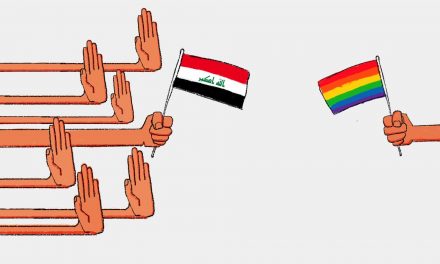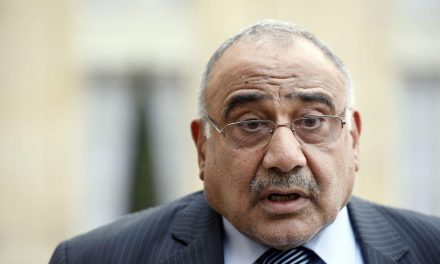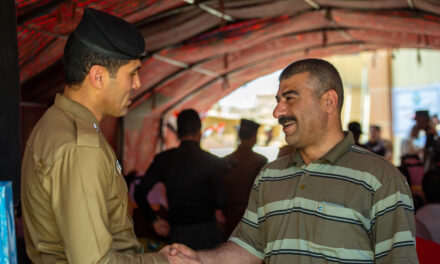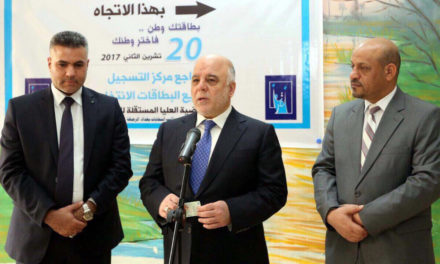Finally, after nearly two months of popular street protests in Iraq, and in the aftermath of the last Friday Sermon and the issues raised by the religious authority of the country, Iraqi Prime Minister Adil Abd Al-Mahdi announced in an official statement his intention to submit his resignation to parliament at the first opportunity. Once the resignation of Adil Abd Al-Mahdi is enacted by parliament, will the situation in Iraq get better and tensions decrease or, in the absence of government, will Iraq plunge into an even deeper crisis?
Following the declarations of the country’s religious authority, communicated through the second sermon delivered by the representative of the religious authority, Sayyid Ahmed Al-Safi on Friday 29/11/2019, regarding the recent clashes in a number of cities, especially Nasiriyah, Najaf, Karbala and some other cities in Iraq, and Parliament’s debate of the current situation, Adil Abd Al-Mahdi announced in an official statement that he intends to submit his resignation to parliament. But the important question remains: what will happen after Adil Abd Al-Mahdi resigns? Will conditions in Iraq improve and tensions abate or, in the absence of government, will the country enter a new round of crises?
These events come hot on the heels of the burning down of the Iranian Consulate in Najaf last week on the evening of Wednesday 27/11/2019. These events also coincided with U.S. diplomatic moves in Iraq, led by the visit of Vice President Mike Pence to Iraq on 23/11/2019, and the arrival in the country of the new U.S. Chairman of the Joint Chiefs of Staff Mark A. Milley three days later. The question that arises is what is the purpose or objective of these moves by the U.S. administration in Iraq? Is there a connection, however tenuous, between the events of the past few weeks and those of the last few days with the moves by the White House?
Given how Iraq’s political map was drawn following last year’s parliamentary elections, it is no surprise that the country entered a new phase of tensions and political jousting between Iraq’s political elite, parties and movements as they jostled for power. Prior to the 2018 elections, we also witnessed extensive efforts by certain Arab states in the region, Iran and the United States to prop up certain political movements and parties in order to gain power, including those who opposed foreign interference in Iraq and reformist forces with western inspired political manifestos. In the course of time, spanning the period between the last elections and the present day, these same forces and actors have participated, by means both fair and foul, in the process of forming a government, in the appointment of members of the Council of Ministers and in numerous important decisions concerning the governing of the country.
Unfortunately, certain elements, persons, parties and political movements currently in parliament and even in the cabinet headed by Adil Abd Al-Mahdi, were ultimately complicit in the prime minister’s failure to bring under control the current frightful state of affairs. Despite all the promises made by Adil Abd Al-Mahdi’s government to curb corruption, improve living standards, tackle unemployment, and repair the country’s infrastructure; the government ultimately proved incompetent and unequal to the task, even to the extent of only taking limited measures and enacting narrow reforms. The continuation of and escalation in the popular protests and, more significantly, with the protests now edging towards unbridled chaos and riots aimed at overthrowing the government, are having a destructive effect on any possible positive outcome.
In the final analysis, none of the strategies adopted by Iraq’s political movements and parties were intended to reform past mistakes nor meet popular demands, instead it now appears that their efforts were aimed at overthrowing the government, thereby engendering greater tensions and divisions in Iraqi society. This state of affairs, however speculative and minor, will in all probability survive the resignation of Abd Al-Mahdi and the start of consultations to appoint the next prime minister, and we will, in all likelihood, witness a new round of tensions and competition between Iraq’s parties and movements for power. The resignation of Adil Abd Al-Mahdi’s government will not only not improve the situation but will also pave the way for a new wave of adventures by some Iraqi political movements, who are widely supported by foreign powers that have played a devastating role in sabotaging Iraq during this period.
Despite all these explanations, the important point to remember is that those in power had the opportunity to influence the turning point in the popular protests in Iraq. But regrettably they failed to bring about any meaningful changes in the constitution, the electoral law or the political parties’ law.
The U.S.’s diplomatic push with last week’s visit by Vice President Pence to Iraq and the arrival of the new U.S. Chairman of the Joint Chiefs of Staff Mark A. Milley three days later, coincided with the recent developments and escalation in the violent protests in Iraq, especially in Najaf and Nasiriyah, as well as with the efforts to ignite protests in the central and southern provinces; and with forcing Adil Abd Al-Mahdi to resign. With it the following question comes to mind: what purpose or objective is the American Administration aiming to achieve in Iraq with these moves, which come under the cover of diplomacy? Is there a connection between the events of the past few weeks and more particularly the last few days and the manoeuvres by the White House?
There is little doubt that the United States and certain other foreign powers will benefit from every opportunity that keep the protests in Iraq alive and to change their course towards chaos, riots and unending conflicts. Hence, the visits by the White House officials to Iraq are simply an attempt to prolong and escalate tensions in Iraq.
Fears were also raised by Grand Ayatollah Ali Al-Sistani through the second sermon delivered by his representative, Sayyid Ahmed Al-Safi on Friday 29/11/2019 which proved to be one of the most critical and precise speeches of the recent past, in which he pointed to foreign involvement in spreading chaos and destruction and to Iraq being dragged into a civil war, stating, “Enemies and their proxies are planning to achieve their malicious goals, from spreading chaos and destruction to internal feuding, and to return the country to an age of abominable dictatorship; everyone must therefore cooperate to deny them the opportunity.”
With the Iraqi street being seized from the hands of the political parties, movements and politicians, society at large is now pinning its hopes on the religious authority in Najaf; forming a new phase in Iraq in the absence of government; especially if Adil Abd Al-Mahdi refuses to accept the post of caretaker prime minister and run the country until his successor is elected.
As such, the resignation of the government and the prime minister may only be the first step, which will undoubtedly lead to controversy and conflict with the views of other local players on the Iraqi scene, and lead the country to an unknown fate. On the other hand, consultations between the various individuals, parties and movements represented in parliament to elect a new prime minister are likely to become protracted and that would deprive the country of its legitimate government for several months.
In addition to the above, the country will have to contend with the partisan divisions within the parliamentary coalitions holding power: the Sairoon coalition, on the one hand, and the Fatah coalition, on the other. On this basis, it is clear that the squabbling amongst the numerous parliamentary blocs in their quest for power will become even more heated in the coming days, elevated to new heights by the power vacuum left by the resignation of the prime minister. There are also calls to form a technocratic government or an interim government to oversee early Iraqi elections. It remains to be seen if this the right solution to stop the bloodshed in Iraq.

Hayder Al-Khafaji
Hayder Al-Khafaji is a researcher on Middle Eastern affairs with a specialist focus on Iraq-Iran relations. He holds a postgraduate certificate in Islamic Studies from Birkbeck College, University of London, and a master’s degree from Middlesex University where he is currently completing a Professional Doctorate in Muslim cultures.










